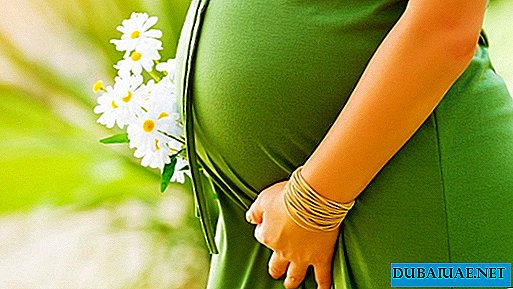 The WORLD WILDLIFE FUND has come to the conclusion that, in terms of the per capita population, the emirates will take the first place in the ranking of countries with the most negative environmental impacts. GETTING DOWN TO THE WORLD COMMUNITY, RESIDENTS OF THE UAE HAVE TO DO FOR MYSELF AND FOR NUMEROUS TOURISTS. HOW TO RELAX FROM CONSCIENCES OF CONSCIENCE BEFORE THE STREAMS IN EACH SEPARATELY TAKEN HOUSE, ANASTASIA ZORINA TELLS ON HIS OWN EXPERIENCE SURE THAT TO BE "GREEN" EVERYTHING WERE NOT.
The WORLD WILDLIFE FUND has come to the conclusion that, in terms of the per capita population, the emirates will take the first place in the ranking of countries with the most negative environmental impacts. GETTING DOWN TO THE WORLD COMMUNITY, RESIDENTS OF THE UAE HAVE TO DO FOR MYSELF AND FOR NUMEROUS TOURISTS. HOW TO RELAX FROM CONSCIENCES OF CONSCIENCE BEFORE THE STREAMS IN EACH SEPARATELY TAKEN HOUSE, ANASTASIA ZORINA TELLS ON HIS OWN EXPERIENCE SURE THAT TO BE "GREEN" EVERYTHING WERE NOT.
ALREADY HERITENED, SO HEREED ...
Recently, British environmentalists awarded the Beckham couple the shameful title of "the most environmentally unclean family" in the world of celebrities. According to experts from the Carbon Trust, David alone accounts for at least 163 tons of carbon dioxide released into the atmosphere per year. 163 tons - this is serious: the average compatriot of the British football player differs in some 9.4 tons there. And Beckham has several houses and almost two dozen cars. And garbage - just tons!
The carbon dioxide, which each of us voluntarily and involuntarily produces daily, is largely responsible for global warming. We produce carbon dioxide at every step: flying on airplanes, including a lamp on the desktop, watching TV, buying French chickens in Dubai. You may not know, but the gas that you send to the atmosphere today will be there for another ten years, or even more ...
Add to the “carbon footprint” tons of detergent poisoned water produced annually by households. Tens of tons of household waste, most of which will never be recycled. And emissions from the operation of the car, and the harm from the production of fuel for him. It turns out far from a rainbow picture ... People, houses, areas, cities, countries, regions have already inherited so that the atmosphere can not cope.
If today the punishing finger from the poster pointed to each of us, then a person from him would ask, "What have you done today for planet Earth?" You can do a lot and it is extremely simple. Below are just a few recommendations for home and family that you should pay attention to, at least for a start. They will help not only to save our Earth, but also directly affect the reduction of utility bills.
ELECTRICITY: WHEN THE LIGHT DID NOT CUT
The volume of electricity consumption is directly related to global warming processes, including due to the incredible costs of the same electricity and fuel for its production. In the Emirates, they spend electricity with the generosity of kings: both the state and business to illuminate buildings, as well as ordinary residents and tourists for their own dubious needs. At the same time, saving electricity is not difficult, it requires only a good memory and a little effort to perform simple operations.
What to do?
• Surprisingly, it is a fact: you personally can save the Amazon rainforest from death, just by accustoming yourself to press the light switch button every time you really do not need it. In daylight, it is better to use natural light.
• The introduction of the habit of not leaving household appliances and appliances in standby mode, and disconnecting them from the network as soon as you finish using them, will be of considerable help. A charger for a mobile phone left plugged into the wall socket without the phone itself is heated and 95% of the energy is wasted. If you have not replaced the “screen saver” with just a “black screen”, do this too: it does not store any screen, but slowly sucks the precious health of the Planet from the network.
• Change incandescent bulbs to energy-saving fluorescent ones: they cost more, but live 10 times longer and consume 5 times less, without spending up to 90% of electricity consumption for heat generation. Regular dusting of the surfaces of lamps and shades also significantly affects the brightness of the light.
• Set the air conditioner to +25.5? C (78? Fahrenheit) and put it in "auto" mode, not "on". Each degree upward increases the energy consumption for cooling by 9% and, as a result, the expense for its use. Change air conditioner filters at least once a month and open windows more often.
• Keep the refrigerator away from heat sources. Set the refrigerator compartment relay to +3.3 ° C, and the freezer compartment relay to -12 ° C. Systematic defrosting will help to save energy consumption, as well as the habit of not keeping the refrigerator door open for a long time: every minute requires three minutes of active bringing to the set temperature.
• You need to cook on an electric stove in dishes whose bottom diameter corresponds to the diameter of the burner or slightly larger than it. Dishes with a curved bottom can lead to an excessive consumption of electricity up to 40-60%. Use full power only before boiling, then it is worth moving the stove to the smallest. A tightly closed lid will reduce cooking time by a third.
• Environmentalists have calculated that most users of electric kettles boil much more water than they need, but this simple household appliance “eats” energy with great appetite. By the time, not removed scale, by the way, worsens the heat conductivity of the kettle, and the water boils much more slowly.
• Another important reserve for energy savings is the use of specialized cooking appliances, such as microwave ovens.
• Another enemy of nature is washing machines and tumble dryers. The main thing here is not to overdo it with loading, but also not to load less than the norm, when the energy consumption is up to 15%. The lower the temperature of the wash, the less harm it does. 30 ° C and no prewash is ideal. The correct sorting of linen also helps. "Appetites" of drying units are almost equal in the house, therefore, the good old clothesline continues to be the most environmentally friendly device for drying.
• When buying new equipment, it’s time to start paying attention to the category of energy consumption. All decent large household appliances are divided into classes: A, B, C - from very economical to economical; D is an intermediate value; E, F, G - from high to very high power consumption.
WATER: DROPS STONE GRINDS
My first visit to Germany turned into a daily struggle with a housewife, which allowed me to take a shower no more three minutes in the morning and five minutes in the evening. She really timed it, I'm not joking! For six months, I never managed to take a bath. But I learned how to turn off the faucet while brushing my teeth and, perhaps, this is a good habit.
three minutes in the morning and five minutes in the evening. She really timed it, I'm not joking! For six months, I never managed to take a bath. But I learned how to turn off the faucet while brushing my teeth and, perhaps, this is a good habit.
The UAE is a country of deserts, but everyone seems to have forgotten about this for a long time. Almost every drop of fresh water here was once a “drop in the sea", and now environmentalists are sounding the alarm: because of the active work to desalinate, the Emirates cause irreparable harm not only to local bays, but also to the entire oceans.
What to do?
• Surprisingly, it is a fact: a "white friend" of a person - a household toilet - consumes up to 30% of the water in the house, more than any other household item. Many old-style toilets take up to 27 liters of water per flush, which can be up to 83 thousand liters per year, which went into the sewers aimlessly! To save money, you can run in the tank the so-called "hippo" - a small bottle of water, which reduces its filling. New toilet models do the job well, spending only 6-7 liters of water per flush.
• Elimination of commonplace small leaks will save up to 120 liters of water per week. By the way, it’s toilet bowls that are most often hidden by secret leaks.
• Taking a daily shower is much better than a bath: savings can be up to 80 liters of water at a time. But the shower can not be abused until a special nozzle is installed, limiting the flow of water to 9.5 liters per minute. Thus, a five-minute shower will cost you 47.5 liters.
• If you follow the example of the Germans and turn off the faucet while brushing your teeth, shaving, and washing dishes, then do not waste in vain at least 6 liters of water per minute.
• Ways to save energy for washing machines also minimize water consumption. This also applies to dishwashers.
• A good move would be to switch to environmentally friendly cleaners and detergents. They are sold in Organic Foods & Cafe supermarkets and Dubai stores, are much more expensive than ordinary ones, but do not poison the waste water. They will always be successfully replaced with simple soda, vinegar and even “Kola”, which clean the toilets is a pleasure.
And instead of the usual washing powder, try using "soap nuts", a natural product that will preserve both nature and your skin with health.
GARBAGE: A WHEEL OF THINGS IN NATURE
 If we take all the Dubai rubbish in total and divide it by the number of inhabitants, we get 730 kg per person per year, too much even by average world standards. This is taking into account the tourist contribution. In Australia, people produce 400 kg, no more, although the Australians are still far from ideal. The waste of the Augean stables is just babble compared to what scavengers take out every day from our houses.
If we take all the Dubai rubbish in total and divide it by the number of inhabitants, we get 730 kg per person per year, too much even by average world standards. This is taking into account the tourist contribution. In Australia, people produce 400 kg, no more, although the Australians are still far from ideal. The waste of the Augean stables is just babble compared to what scavengers take out every day from our houses.
Up to 35% of household waste can be recycled: paper, glass, cans, plastic; even mobile phones and printer cartridges are recycled successfully. But Dubai is used to sending everything in containers as is - indiscriminately and without arrangement. In waste processing plants, this is sorted, but not all garbage gets there. In the matter of using cellophane and plastic, the Emirates are generally sinful to the full extent: by consuming harmful material in tons, we forget that it is not only tenacious, but its production is extremely harmful to the environment.
What to do?
• Sorting garbage at home is actually not difficult. If the packaging contains a well-known sign indicating the possibility of processing, you need to use it. The main thing here is to stop collecting everything in one bag, and to allocate different containers for this and slowly get used to the new state of things.
• Whenever possible, buy drinking water in large bottles. Small bottles are best washed (if they had milk or kefir) and flattened so that they take up less space. White plastic bottles will become the raw material for the production of pipes for underground cables and water, and transparent bottles will be used for the manufacture of polyester fibers, from which they then make fleece clothes and upholstery for car interiors. Add plastic bottles for cleaning products here. Few know that arbitrarily thrown of fate, a plastic bottle naturally leaves the Earth only a hundred years later.
of fate, a plastic bottle naturally leaves the Earth only a hundred years later.
• Glass and aluminum products are among the most sustainable materials - a can from a Coke needs at least 500 years to turn into dust, and a glass can from two times as much - ten long centuries. At the same time, household glass battles are used for smelting and as raw materials for many building materials. And the production of one new aluminum can from scratch requires as much energy as the manufacture of 20 cans from recycled materials.
• It's time to get used to shopping with your string bag, as in the good old days. Fortunately, many supermarkets began selling reusable shopping bags. In extreme cases, try to take as few free packages as possible for packaging and ask them to wrap the cut in one rather than five layers of cellophane. This simple way can significantly reduce deforestation and oil consumption.
• Used electronics, household appliances, mobile phones, batteries, light bulbs and spray bottles are not only harmful to the environment, but simply dangerous if not disposed of properly. Do not forget about it!
• Save paper! 1 million tons of paper waste paper is saved from deforestation by a whole forest, namely, Dubai produces almost so much waste paper almost every month.
• It is better not to send all suitable and no longer needed things and household items to the trash bin, but to donate to charitable organizations, of which there are dozens in the Emirates. And help people, and save nature.
Since the Emirates has not yet introduced a widespread garbage sorting program, as, for example, in Germany, where it is almost a crime to interfere with plastic and glass, it is necessary to sort through simple human laziness and bring garbage bags to recycling points. Paper and products from it can be thrown into the "Ikea". All recyclable items are accepted at points in the Emirates Environment Group, which has 88 recycling points in the UAE, 39 of which are located in Dubai. A list of items is available at www.eeguae.org. Also in some new areas of Dubai, Recycle Dubai (www.recycle-dubai.com) operates, which provides free litter boxes and picks them up once a week.
VACATION: FEEL YOURSELF AS HOME, BUT DO NOT FORGET YOUR GUESTS
 Not only are the Emirate hotels famous for their high level of service, on vacation do not want to think about anything other than relaxation, especially about the environment. And yet, it's time for vacationers to "turn green!" Here, the simplest way to be a friend of nature is to act like at home, with a share of masterful ingenuity.
Not only are the Emirate hotels famous for their high level of service, on vacation do not want to think about anything other than relaxation, especially about the environment. And yet, it's time for vacationers to "turn green!" Here, the simplest way to be a friend of nature is to act like at home, with a share of masterful ingenuity.
Tourists will benefit from all the tips listed above, but there is one more thing: do not change bed sheets every day and do not use all hotel towels at the same time: save a couple of innocent fish and a small country called the UAE.
As you can see, to help a tired planet whose natural resources are depleted, each of us needs to do nothing: at least learn to turn off the lights when leaving the room, turn off the water while brushing your teeth and not print books on the printer. In other words, to show a certain share of responsibility for our common heritage - the atmosphere of the Earth. The only and irreplaceable. And then you will not contribute to the destruction of pink flamingos, the melting of the snow of Kilimanjaro and the untimely death of tomatoes grown on clean manure and therefore velvet inside.












